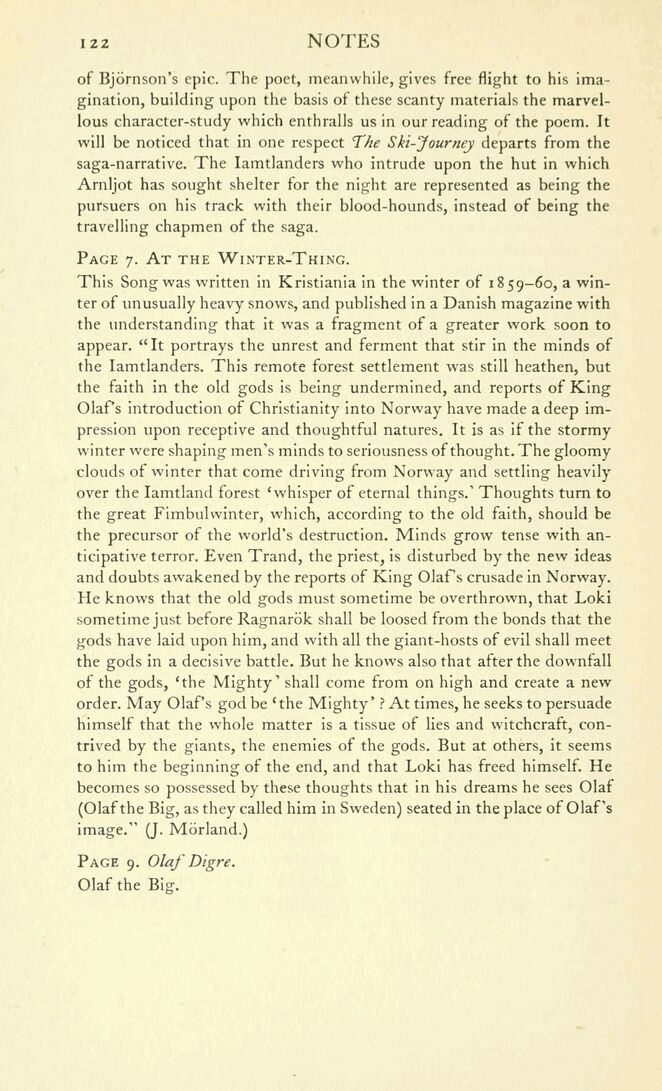
Full resolution (JPEG) - On this page / på denna sida - Sidor ...

<< prev. page << föreg. sida << >> nästa sida >> next page >>
Below is the raw OCR text
from the above scanned image.
Do you see an error? Proofread the page now!
Här nedan syns maskintolkade texten från faksimilbilden ovan.
Ser du något fel? Korrekturläs sidan nu!
This page has never been proofread. / Denna sida har aldrig korrekturlästs.
122 NOTES
of Bjornson’s epic. The poet, meanwhile, gives free flight to his ima-
gination, building upon the basis of these scanty materials the marvel-
lous character-study which enthralls us in our reading of the poem. It
will be noticed that in one respect The Ski-Fourney departs from the
saga-narrative. The Iamtlanders who intrude upon the hut in which
Arnljot has sought shelter for the night are represented as being the
pursuers on his track with their blood-hounds, instead of being the
travelling chapmen of the saga.
Pace 7. AT THE WINTER-THING.
This Song was written in Kristiania in the winter of 1859-60, a win-
ter of unusually heavy snows, and published in a Danish magazine with
the understanding that it was a fragment of a greater work soon to
appear. “It portrays the unrest and ferment that stir in the minds of
the Iamtlanders. This remote forest settlement was still heathen, but
the faith in the old gods is being undermined, and reports of King
Olaf’s introduction of Christianity into Norway have made a deep im-
pression upon receptive and thoughtful natures, It is as if the stormy
winter were shaping men’s minds to seriousness of thought. The gloomy
clouds of winter that come driving from Norway and settling heavily
over the Iamtland forest ‘whisper of eternal things.’ Thoughts turn to
the great Fimbulwinter, which, according to the old faith, should be
the precursor of the world’s destruction. Minds grow tense with an-
ticipative terror. Eyen Trand, the priest, is disturbed by the new ideas
and doubts awakened by the reports of King Olaf’s crusade in Norway.
He knows that the old gods must sometime be overthrown, that Loki
sometime just before Ragnarok shall be loosed from the bonds that the
gods have laid upon him, and with all the giant-hosts of evil shall meet
the gods in a decisive battle. But he knows also that after the downfall
of the gods, ‘the Mighty’ shall come from on high and create a new
order. May Olaf’s god be ‘the Mighty’ ? At times, he seeks to persuade
himself that the whole matter is a tissue of lies and witchcraft, con-
trived by the giants, the enemies of the gods. But at others, it seems
to him the beginning of the end, and that Loki has freed himself. He
becomes so possessed by these thoughts that in his dreams he sees Olaf
(Olaf the Big, as they called him in Sweden) seated in the place of Olaf’s
image.” (J. Morland.)
PacE g. Olaf Digre.
Olaf the Big.
<< prev. page << föreg. sida << >> nästa sida >> next page >>